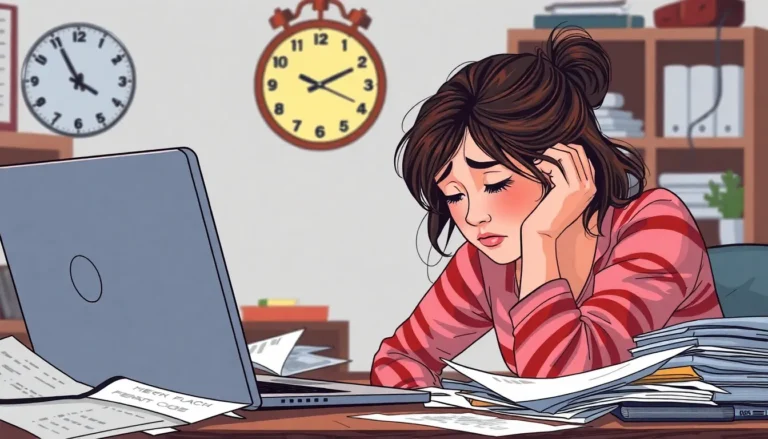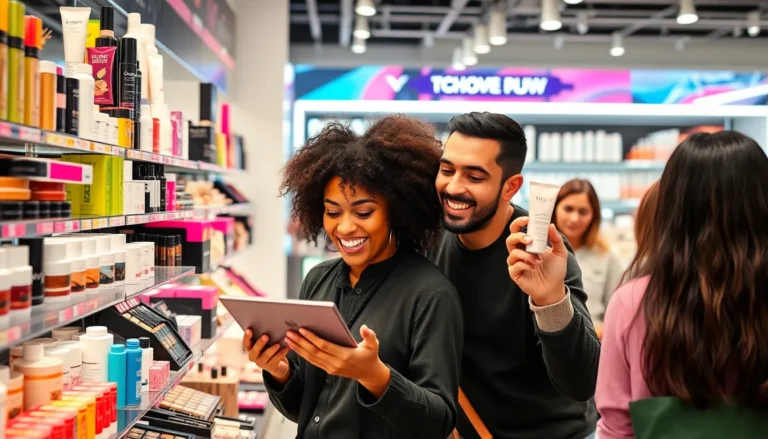In a world where scrolling through feeds is as common as breathing, it’s easy to overlook the darker side of social media. What starts as harmless fun can quickly spiral into a toxic swamp of comparison, anxiety, and endless drama. Picture this: you’re just trying to catch up on the latest cat memes, but suddenly you’re knee-deep in a debate about pineapple on pizza. Yikes!
Social media platforms, while designed to connect people, often leave users feeling more isolated than ever. The pressure to present a perfect life can be overwhelming, leading to a cycle of discontent. It’s time to take a step back and examine whether those likes and shares are worth the mental toll. After all, who needs a virtual popularity contest when real-life connections are waiting just outside the screen?
Table of Contents
ToggleUnderstanding the Toxicity of Social Media
Social media platforms can contribute significantly to feelings of distress and disconnection. These channels, designed to foster connection, often amplify negative emotions instead.
Psychological Effects on Users
Users frequently experience heightened anxiety and low self-esteem due to social media interactions. Exposure to curated lifestyles can trigger comparisons, leading to feelings of inadequacy. Individuals often internalize these narratives, affecting overall self-worth. Ultimately, consistent engagement in these environments can shape harmful beliefs and behaviors.
Impact on Mental Health
Social media’s role in mental health issues is increasingly evident. Studies indicate a strong correlation between social media use and depression. Users exposed to constant negativity or cyberbullying may develop heightened feelings of isolation. Emotional fatigue can result from the pressure to maintain an ideal online persona. Users sometimes find that habitual scrolling steals time from real-life interactions, compounding feelings of loneliness.
Reasons Why Social Media Is Toxic

Social media platforms can foster an environment rife with negativity. Users frequently navigate harmful behaviors that affect mental health.
Comparison Culture
Comparison culture thrives on social media as users showcase curated, often unrealistic lives. Individuals feel pressured to measure up to these idealized standards. Effects include increased anxiety, self-doubt, and dissatisfaction. Research indicates social media users who engage in frequent comparison experience higher rates of depression. Over time, this constant evaluation shapes harmful self-perceptions. It’s essential to recognize that many images and posts represent a highlight reel, not reality. Authenticity often takes a backseat, leading to isolation and diminished self-worth.
Cyberbullying and Harassment
Cyberbullying and harassment contribute significantly to social media’s toxic atmosphere. Victims often face relentless attacks and cruel comments in digital spaces. Nearly 36% of young users report being bullied online, manifesting serious emotional repercussions. Such experiences can lead to feelings of anxiety, sadness, and loneliness. Perpetrators often hide behind anonymity, amplifying the distress victims feel. Unlike traditional bullying, the digital landscape blurs boundaries, making it challenging to escape harmful encounters. Ongoing harassment undermines users’ confidence and can result in long-lasting psychological effects.
The Role of Algorithms
Algorithms shape social media experiences and dictate the content users see. They often create echo chambers that amplify specific perspectives while drowning out opposing views.
Echo Chambers and Filter Bubbles
Echo chambers occur when algorithms prioritize content that aligns with users’ existing beliefs. Users receive a steady stream of similar viewpoints, reinforcing their opinions and limiting exposure to diverse ideas. Filter bubbles exacerbate this isolation, preventing users from engaging with alternative perspectives. Such environments can lead to polarization, where individuals become more extreme in their views and less tolerant of differing opinions. Research indicates that these phenomena contribute to societal divides, making meaningful dialogues increasingly challenging.
Addiction and Time Consumption
Algorithms also play a crucial role in driving addiction and excessive time spent on platforms. They encourage users to scroll endlessly through curated content, designed to captivate attention. Notifications and updates further hook users, creating a continuous cycle of engagement. Studies reveal that high social media usage correlates with decreased productivity and increased stress levels. Time spent online often cuts into real-world interactions and personal well-being, fostering feelings of regret and dissatisfaction.
How to Mitigate the Toxic Effects
Mitigating the toxic effects of social media requires proactive steps. Users can take control of their online experiences through awareness and intentional actions.
Setting Boundaries
Establishing boundaries benefits mental health. Limiting screen time can reduce anxiety caused by endless scrolling. Users might choose specific times to check social media, helping maintain focus on real-life interactions. Turning off notifications minimizes distractions and prevents compulsive checking. Finding a designated space for social media use creates physical distance from other activities, reinforcing boundaries. Setting criteria for what content is shared and consumed encourages mindful engagement.
Digital Detox Strategies
Implementing digital detox strategies promotes overall well-being. Designating tech-free zones, such as bedrooms or dining areas, supports healthier habits. Engaging in offline hobbies allows users to rediscover interests outside the digital realm. Scheduling regular breaks from social media fosters space for reflection and mindfulness. Replacing social media time with physical activities, like walking or exercising, boosts mood and reduces stress. Users can also consider temporary account deactivation to better assess their relationship with social platforms. Prioritizing genuine connections over online validation fosters healthier social interactions.
Social media’s toxic nature can’t be ignored. It fosters a culture of comparison that leads to anxiety and feelings of inadequacy. The pressure to present an idealized version of life often overshadows the importance of authentic connections.
By recognizing these detrimental effects, users can take steps to reclaim their mental well-being. Prioritizing real-life interactions and setting boundaries around social media use can significantly improve emotional health. Embracing genuine relationships over online validation offers a path toward a more fulfilling and connected life.








